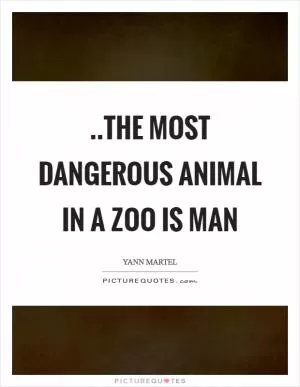Animals don't escape from somewhere but from something

Animals don't escape from somewhere but from something
In Yann Martel's novel "Life of Pi," the protagonist, Pi Patel, finds himself stranded on a lifeboat in the middle of the Pacific Ocean with a Bengal tiger named Richard Parker. Throughout the novel, Pi reflects on the nature of animals and their behavior, ultimately coming to the realization that "animals don't escape from somewhere but from something."This statement holds a profound truth that is central to the novel's themes of survival, resilience, and the human-animal connection. In the case of Pi and Richard Parker, both characters are forced to confront their own instincts and fears in order to survive in the harsh and unforgiving environment of the open sea. Pi, a young boy who has grown up in a zoo, must learn to coexist with a wild and dangerous predator, while Richard Parker must overcome his own predatory nature in order to form a bond with Pi.
The idea that animals don't escape from somewhere but from something speaks to the innate drive for survival that all living creatures possess. In the wild, animals are constantly faced with threats to their safety and well-being, whether it be from predators, natural disasters, or human encroachment. In the case of Richard Parker, his escape from the confines of the zoo represents a desire for freedom and autonomy, a longing to return to his natural habitat where he can roam and hunt as he pleases.
Furthermore, the statement also highlights the idea that animals are not passive beings, but active participants in their own lives. They are not simply victims of circumstance, but agents of their own destiny. In the case of Pi and Richard Parker, both characters must confront their own fears and insecurities in order to forge a bond that will ultimately save their lives.
Overall, the idea that animals don't escape from somewhere but from something is a powerful and poignant reflection on the nature of survival and the resilience of the human spirit. In "Life of Pi," Yann Martel explores these themes through the unique and captivating relationship between a boy and a tiger, ultimately reminding us of the profound connection that exists between humans and animals.












 Friendship Quotes
Friendship Quotes Love Quotes
Love Quotes Life Quotes
Life Quotes Funny Quotes
Funny Quotes Motivational Quotes
Motivational Quotes Inspirational Quotes
Inspirational Quotes